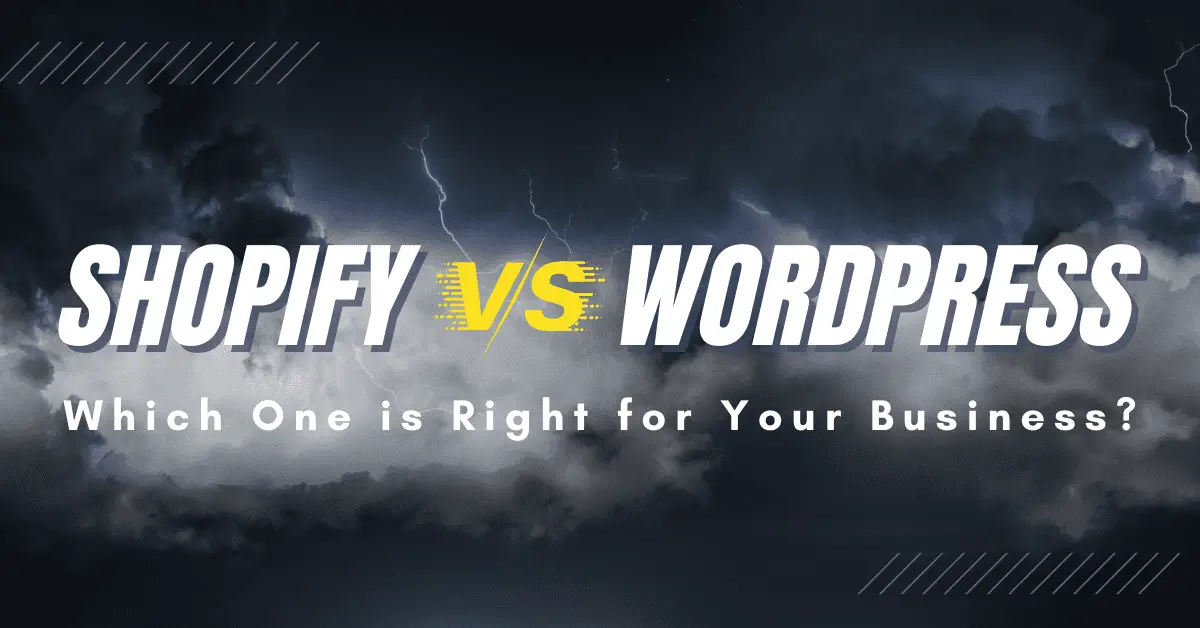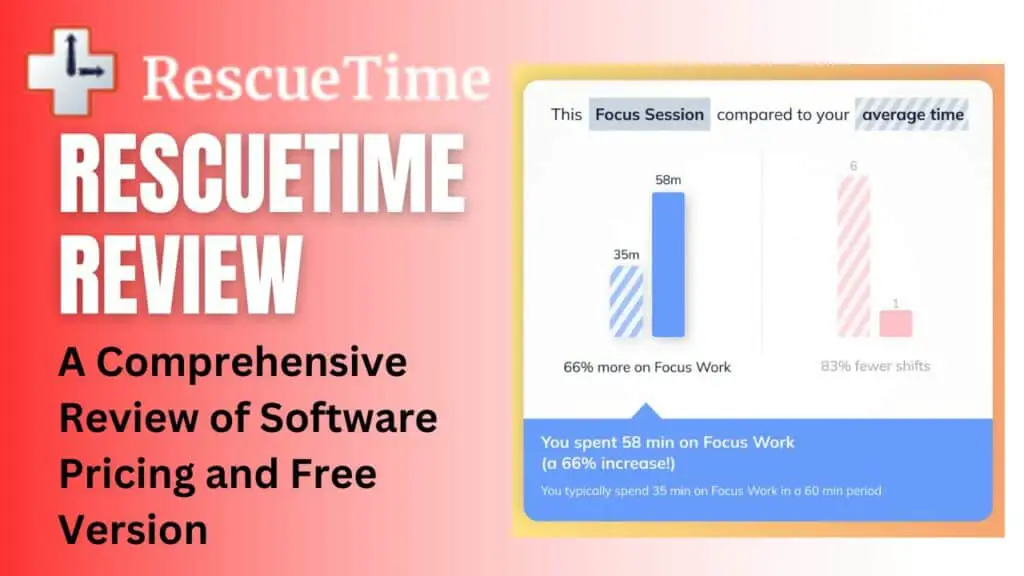Shopify vs WordPress: Which One is Right for Your Business?
If you're planning to start an online business, you'll need to choose a platform to build your website. Shopify and WordPress are two of the most popular options, but they both have their pros and cons. In this post, we'll compare Shopify vs WordPress, two of the most popular website builders, and help you decide which one is right for your business.
DISCLOSURE: Some of the links that I share in this article ARE my affiliate links. This means I may earn a commission, at no extra cost to you. In fact, sometimes you'll get a discount or free credits just FOR using my link. 🙂
What is Shopify?
It is a cloud-based commerce platform which supports multichannel sales designed for small and medium-sized businesses. It is a fully hosted platform, so your store will be hosted on Shopify's servers.
Merchants can use their Shopify ecommerce shop to sell online, on social media, and in-person. Since it is a hosted platform, you don't need to worry about hosting your own website. It also offers a wide range of payment tools and shipping methods that can be integrated into the store.
What is WordPress?
WordPress is a content management system (CMS) that enables you to create a website or blog from scratch. It can also improve an existing website. It is a free and open-source platform, which means that anyone can use and contribute to its development.
There are two versions of WordPress. The first one is WordPress.com which is web-based and the other is WordPress.org which is the self-hosted version of WordPress. You can read more about the differences between the two from the following article: WordPress.com vs WordPress.org
The Pros and Cons of Shopify and WordPress
Both Shopify and WordPress are used by millions of people to create and manage their online stores. While they have some similarities, they also have some key differences.
Shopify is easy to use and has a lot of features that can help you get started quickly.
WordPress gives users more control over their website. It is more flexible than Shopify, but it can be more difficult to use.
To decide which CMS is right for you, you need to first understand what your business needs are.
Generally, if you are starting out on your online business (i.e. involving selling products) journey, I would suggest that you start with Shopify. If you just want to start a blog without much selling or monetary transactions, you can start with WordPress.
This is because there are many other things for you to do and learn when you are starting out. You are better off focusing on developing your online business than spending your previous time figuring out the technical aspects of setting up a WordPress site. Also, if you need a simple website that doesn’t need much customization, then Shopify may be the way to go.
Shopify is a hosted platform, so everything is taken care of for you–from hosting to security to updates. So you can just focus on the more important aspects of your business, which is marketing.
Shopify is a great platform for businesses that are just starting out. It's easy to use and doesn't need any coding knowledge. Businesses of all sizes can use the platform to create a functional store. It also offers users a customizable platform, an easy-to-use checkout process, and a wide range of features.
The flip side of Shopify is that it's a closed platform, so it is only possible to use it to create and manage your store. If you need a lot of customization and control over your website, then WordPress may be a better option.
Key Differences Between Shopify And WordPress
Key differences between Shopify and other eCommerce platforms include its focus on simplicity and its user-friendly interface. It also offers a wide range of features, including a built-in blog, social media integration, and support for many languages.
WordPress is a popular content management system that enables users to create and manage an online store. also It has e-commerce plugins make it easy to add products and take payments, and there are many themes available to give your store a professional look.
I have listed out below the key considerations you may need to consider when making your choice:
In terms of Interface, which platform is more user-friendly?
Shopify is one of the easiest platforms to use for setting up an online store. The platform design is simple and intuitive to navigate. There are plenty of free and paid templates called themes to help users get started. If you're looking to quickly and easily set up an online store, then it is a great option.
In comparison, WordPress is not so easy to use because it needs a lot of coding to create custom designs and features. While it offers some pre-made designs and themes, they are not as user-friendly as those in Shopify. It also needs a bit of customization to get the look and feel you want.w
Therefore, if you are looking for a more customizable and less coding-intensive platform, then WordPress may not be the best option for you. Also, the learning curve for WordPress can be quite steep for those who are not familiar with code or web design.
The Flexibility of Shopify and WordPress
Shopify and WordPress are both very flexible platforms that can be customized to fit any business need. A Shopify store allows you to build a highly customizable e-commerce website, while WordPress is often used as a platform for non-commercial websites. It is possible to use both platforms together to make your e-commerce website a hybrid of the two. Read on to find out how.
Shopify vs WordPress Cost
Since Shopify and WordPress are two of the most popular eCommerce platforms on the market, they both offer a wide range of features and plugins to help you build and manage your online store. However, they also come with a price tag.
Shopify plans start at $29 per month, while for WordPress, it depends on whether you are using .com or .org version (which is the self-hosted of WordPress). Both platforms also charge transaction fees, which can add up if you're doing a lot of sales.

Shopify comes with 3 regular pricing plans: Basic Plan starts at USD$29.00 per month, Standard Plan at USD$79.00 per month and Advanced Plan at $299.00 per month. Also, it also has a ShopifyPlus plan which is an Enterprise-grade solution for high-volume merchants, and large businesses. The cost is based on quotes. All Shopify plans allow listing unlimited products.
And last but not least, Shopify also offers Lite plan which allows you to add products to any website or blog and accept credit card payments for only $9 USD per month. This can be used for adding products to WordPress sites, so it's how you can use both Shopify and WordPress together.
? One little money-saving tip here is you can talk to Shopify support to bring down the cost of your monthly charge by signing up for a longer period at one go. For example, I signed up for three years at once and they could reduce the monthly charge of Standard Plan for me from USD$79 to about USD$60 per month.
~ Penny
WordPress is a free and open-source platform. WordPress.com offers free and paid plans for users, depending on the level of customization and support needed. Users can start with a free plan, which provides basic features and functionality, or upgrade to a paid plan for more advanced features and support. The paid Pro plan costs USD$15 per month and comes with a free domain name for the first year.

While on first look WordPress.org seems to be “cheaper”, it comes with several costs too. For example, you need to pay for between USD$5 – $20 per month for managed hosting. Then if you are using templates, you need to pay about USD$35 – $50 for Basic Theme Templates. There are also other costs such as for security. However, I would think that the biggest cost to using WordPress would be the time you need to spend on learning to use WordPress.
And if you are not technically savvy, you may need to hire external help from places like Fiverr to take care of your WordPress set-up and this may cost from a few hundred to a few thousand dollars, depending on how complicated your website is. You can read more about the real cost of WordPress.org from the article below: WordPress Pricing 2022 | What’s The Real Cost?
The Scalability of Shopify and WordPress
Shopify and WordPress both offer a great deal of flexibility and scalability. Shopify sites are scalable because they can be customized to fit the needs of any business, from a small start-up to a large enterprise. It also offers a wide range of features and plugins that can be added to a site to make it even more scalable.
WordPress sites can be as simple or as complex as you need them to be, and they can be easily expanded and modified as your needs change.
Shopify vs WordPress: Updating and Maintenance
For updating and maintaining a website, Shopify is the clear winner. Shopify is a hosted platform, so all updates and maintenance are handled by Shopify. This is an enormous advantage for busy entrepreneurs who don't have time to deal with website issues. Shopify is constantly developing and new functions are added to help your business.
WordPress is a self-hosted platform. Since it is open source (which means its original source code is made freely available and may be redistributed and changed), it is also being constantly updated. That you need to self-host it means you need to do the update yourself or else some functions may break.
The Security of Shopify and WordPress
Shopify provides SSL certificates for all its stores which help improve security and trust in your store. This is an extra cost that you need to pay if you were to self-host with WordPress.
Shopify also provides a secure shopping experience for its merchants' customers by keeping their security systems up to date with industry best practices. This way, customers can shop with confidence, knowing that their personal information is safe.
With Shopify, businesses can be rest assured that their customer data is safe and secure. In addition, Shopify's fraud detection and prevention tools help keep businesses safe from fraudulent activity.
If you own a self-hosted WordPress site, it is important to take care of security yourself. This includes keeping your WordPress software and plugins up to date, using a strong password, and using a security plugin. Therefore, it is a lot of hassle.
The Customer Support for Shopify and WordPress
While both platforms offer a wide range of features and tools to help businesses build and manage their online stores, Shopify is the clear winner for customer support.
Shopify offers 24/7 customer support via stronger support options such as live chat, email, and phone. My experience with the customer service of Shopify is that they are all very helpful if you need help to set up your store or make changes to it. They always try to go the extra mile to help and follow up.
WordPress customer support is only available via email. So unless you are already very well versed with it and technically savvy, you will probably fumble in the dark and wondering what goes wrong when something is not working.
What's the Build Time Like with Shopify and WordPress?
This is related to the user-friendliness aspect mentioned earlier. Shopify is a hosted platform, so it takes care of all the technical aspects of your website for you. This can make it faster and easier to build a website, hence quicker build time.
A self-hosted WordPress build can take anywhere from a few minutes to an hour or more, depending on the speed of your computer and internet connection. The process involves downloading the WordPress software from wordpress.org, uploading it to your web host and then configuring it with your database details. Once WordPress is installed, you can begin adding content, themes, and plugins to your site.
Considering the time you may need to learn how to use WordPress to do the set-up, you will most likely take longer to set up a WordPress site.
Is Shopify or WordPress better for Search Engine Optimization (SEO)?
There is no simple answer in Shopify vs WordPress for SEO. Both platforms have their pros and cons in optimization. However, Shopify is considered being the better platform for SEO because of its ease of use and comprehensive features.
Shopify stores come with built-in SEO features to help you optimize your content and get found online. Some aspects of SEO are taken care of automatically, such as auto-generated canonical tags which are added to pages to prevent duplicate content from appearing in search results, or your website's sitemap.
The Bottom Line: Which One is Right for Your Business? ?
The bottom line is that there is no one-size-fits-all answer to this question. As mentioned at the start of this post, Shopify is ideal for you if you are just starting your online business, as it's easy to set up and use. After considering the above factors, I would recommend that you start with Shopify if you could afford since it's better in many of the aspects outlined above.
And if you are really tight on budget, perhaps you can consider going for Shopify Lite on your WordPress self-hosted site. This is so that you can still have the security that comes with Shopify for the ecommerce transactions.
My first online store was built in the year 2015 on WordPress and I had spent countless hours and blood and sweat to figure out how to set it up. I then migrated from WordPress to Shopify after 1 to 2 years, when I had more funding available. Back then there was no Shopify Lite so there was no way to use Shopify on WordPress.
For ecommerce and online stores, the most important factor is security which was the main reason I migrated my store to Shopify.
I still remember the horror story my friend, who had set up his website using WordPress told me it was hacked. He almost lost everything on his site and he had to go through a lot of hassle to get it back. This is not to mention the downtime and potential loss of business he suffered.
Conclusion
Shopify and WordPress are both great platforms for businesses of all sizes to create an online store. If you are planning to start an online business, you will need to choose a platform to build your website.
Shopify offers users a customizable platform, an easy-to-use checkout process, and a wide range of features, including a built-in blog, social media integration, and support for many languages. WordPress is also a great platform with a wide range of features, including a built-in blog, social media integration, and support for many languages.
My personal recommendation would be to start with Shopify if you could afford given its security and ease of use and if you limited in funding, perhaps you can consider going for Shopify Lite with your WordPress self-hosted site.
So are you ready to set up your store on Shopify? You can get 14 day's FREE trial to see for yourself how easy it is to set up your online store! Click on the image below to start the free trial.

Below are some popular questions related to this topic. I have also provided answers to them below:
Shopify vs WordPress Frequently Asked Questions (FAQ)
❓ Is Shopify better than WordPress?
Shopify is a platform that allows users to create their own online stores. WordPress is a content management system (CMS) that can be used to create a website or blog. Shopify is a better platform for creating an online store because it is more user-friendly and has more features than WordPress. It is also better in terms of those considerations outlined earlier in this post.
❓ Can Shopify be used with WordPress?
As mentioned earlier, Shopify offers a Lite plan which allows you to add products to any website or blog and accept credit card payments for only $9 USD per month. This can be used for adding products to WordPress sites, so it's how you can use both Shopify and WordPress together.
❓ What are the advantages of eCommerce using Shopify vs WooCommerce on WordPress?
There are many advantages to using Shopify over WooCommerce for eCommerce. For one, Shopify is a hosted platform, so all the technical aspects of running an online store are taken care of by Shopify. This is a tremendous advantage for those who are not tech-savvy or do not have the time to manage these aspects themselves.
❓ Which platform is better for blogging Shopify or WordPress?
Shopify is mainly built for Ecommerce online stores so it's strength lies there. Starting a blog is a great way to build an audience and generate more traffic and sales for your business. Shopify's online store comes with a built-in blogging engine for content marketing, making it easy to get started.
By blogging about your products and your brand, you can create a community of customers and followers who are interested in what you offer.
While Shopify provides blogging capabilities for its online store, WordPress may be the better choice if your main purpose is to start a blog. You can always add in functionality to sell products or services subsequently with Shopify Lite or WooCommerce.
❓ Which is a better platform for an ecommerce website in the long run WordPress or Shopify?
There is no definitive answer to this question, as it depends on individual needs and preferences. However, WordPress is considered more flexible and customizable than Shopify, and thus may be a better option for businesses that need a more complex or specific ecommerce website.
In addition, WordPress is a free and open-source platform, while Shopify requires users to pay a monthly subscription fee.
❓ Which is cheaper, WordPress or Shopify and is Shopify really more expensive in 2022?
Again, there is no definitive answer to this question as it depends on several factors, such as the specific features and plugins you need, the level of customization you need, and the amount of traffic your website receives.
That said, the self-hosted WordPress platform seems to be more affordable than Shopify with a wide range of free and paid themes and plugins available. Even when looking at the pricing plans for both WordPress.com and Shopify, it appears that Shopify is the more expensive option since WordPress.com has a free plan with very limited functionality.
The paid plan of WordPress.com costs USD$15 per month while Shopify's cheapest plan being $29 per month. However, this is like comparing apple with orange so it's not a fair comparison.
As shared earlier in the article, there are still many costs involved in setting up a WordPress website such as time spent in learning and maintaining the WordPress site. In addition, while you can host a WordPress site on any web hosting service, Shopify is a closed platform that only works with their own hosting.
So, while the upfront cost of WordPress may be cheaper, the long-term costs of it could end up being more especially when you take into consideration the potential costs of security should the unfortunate happen.
❓ Can I use WordPress and Shopify for free?
You can use WordPress.com for free as it offers a very limited free plan. However, you cannot use your own domain as all WordPress.com sites are sub-domains on WordPress.com. Therefore, your website will have a web address like “YourDomain.WordPress.com”.
As mentioned earlier, even though the self-hosted WordPress is free to use, you need to pay for domain and web hosting so it's not entirely free. For Shopify, you can use it free for 14 days during trial and you need to choose one of the paid plans after that.
❓ Can I dropship with WordPress?
Yes, you can dropship with WordPress. You can use WordPress plugins such as Alidropship to help with dropshipping. Dropshipping can be a great way to start an online business. You will need to find a reliable dropshipping supplier. Make sure your WordPress website is set up properly before dropshiping.
❓ Do you have to pay for hosting with Shopify?
Shopify plans come with web hosting included, so you don't have to pay for web hosting separately.
❓ What is the best hosting provider for WordPress?
In my experience, SiteGround provides excellent 24-hour chat customer service for hosting, so you should definitely consider them as when you are just starting you probably need a lot of support. I remember when I migrated my site from another hosting provider, SiteGround also helped me with the site migration for free.









This is a very detailed comparison of Shopify and WordPress for an ecommerce business. I am a bit confused though as you mention that a lot of coding is required for WordPress. I have a WordPress blog and have not had to do coding so far, so is coding required for setting up the ecommerce side and being able to sell?
Shopify seems to be the easier option for setting up an ecommerce business, but can one also published blog posts on it? Thank you.
Hi LineCowley, Thanks for your comment and question! Compared to Shopify, WordPress is highly customizable so you can use HTML and CSS to customize to add functionalities or to achieve specific look and feel. This is the coding part I was referring to. You probably have not needed to use coding for your WordPress blog as you have used theme templates and not been doing much of customization. For the setting up of the ecommerce part, you can use WooCommerce to do it. Again if there is a need to customize, then coding may be required.
For Shopify, it has blogging capability but maybe an overkill for you if all you want is just to use it for blogging as its power comes from its ecommerce capabilities and security. You may wish to consider the Shopify Lite plan which will allow you to add on Shopify’s power to your existing WordPress blog if you wish to add ecommerce capability to your blog subsequently. 🙂
Thank you for such an informative article. I am in the online blogging field for the past 5 years and I am doing well. I was also stuck between these 2 when I was starting my online journey but since all my website was blogging website therefore I chose WordPress. There is no doubt that WordPress is more complicated than Shopify, but once you grasp the knowledge, then you can modify each and every aspect of your website in order to create a user-friendly and attractive user experience. I have never tried Shopify, but WordPress proved to be a gem for me.
Hey Hari, Thanks for your sharing! Yes, WordPress may be a better choice for blogging and it’s also power if one takes the time to learn to use it. For starting ecommerce stores and businesses that involve online transactions, I recommend starting with Shopify to cut short the lead-time to market and focus more on the marketing and business aspects of the online business. 🙂